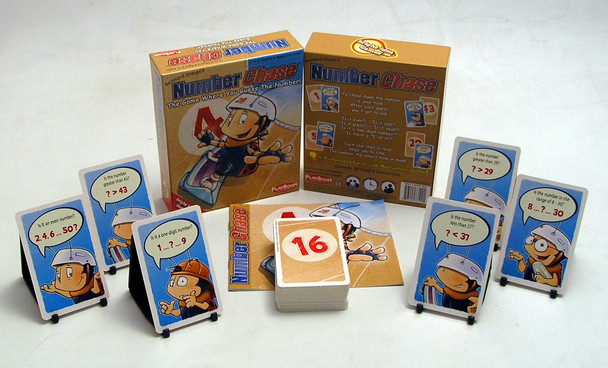Description
A Numerical Logic and Reasoning Game
Game design by Reinhard Staupe.
Number Chase is the game where you guess the number! Figure out the mystery number that has been chosen before your opponents do! One at a time, each of the other players try to guess the number. If the guess is wrong, the number is turned over to reveal a question, and the answer will be a clue to help out the other players. If the guess is correct, the player receives that number card as a point.
Can you “chase” down the correct number first?
Encourages deductive reasoning, builds basic number comparisons and identification skills, social interaction play, fun for all ages.
For 2 to 5 players, 15 minutes playing times, ages 6 to adult.
Contents: 50 playing cards and instructions in English, Spainish and French.
Review by Ben Rainbird. Actor and games enthusiast:
Number Chase is an educational game for three to five players, that teaches numerical logic and reasoning along with guesswork. However, as that concept may sound rather terrifying to a youngster (I know it does to me), we will go along with the game’s conceit and pretend it’s about cute, skateboarding ladybirds. As you do…
In Number Chase, there’s a hidden number, from one to fifty, which only one player knows. The other player/players must try to guess the number, through a process of elimination. Included are 50 cards, all numbered. On the back of each card is a question. These are laid out in order, number-side up, from 1 to 50. The players take turns being the Writer, the person who knows the secret number, starting with the oldest player. The Writer thinks of a number between 1 and 50, and writes it down secretly on a sheet of paper. Now, the other player or players take it in turns to point at one of the cards, read its number out loud, and ask if it’s the secret number. If it isn’t, the player flips over that card and reads out the question on the other side, which the Writer has to answer truthfully.
These are all geared towards helping to narrow down the field of possible numbers, with questions such as “is the number greater than 8?” or “is it a double-digit number?”. By remembering the answers, players can deduce the secret number, until someone gets it right, receiving the relevant card as a point. The first to win three cards is the winner.
I think it’s good fun with a bit of ‘stealth education’, and I can only applaud the way this range of games consistently merge the two together so successfully. However, I can’t shake the feeling that this should have been a detective game! All the rules would lend themselves very well to this theme – you have some basic maths, deductive reasoning, and using a process of elimination to narrow down a field of possible candidates, so as to isolate the correct one. This could easily have been accomplished simply by putting a picture of some shifty-looking character on each of the cards in addition to the number. I think it would hold children’s interest more if they were playing detective, tracking down baddies. Unfortunately this theme seems to have already been claimed by Sherlock. The game’s aesthetics are still perfectly adequate as it is, but it seems a bit tenuous to me, and more could have been made of it. I cannot fault actual game mechanics though, it’s fast and fun, very well put together, and keeps you thinking and guessing.





